2022届高考英语二轮复习:虚拟语气的用法全面总结学案
文档属性
| 名称 | 2022届高考英语二轮复习:虚拟语气的用法全面总结学案 | 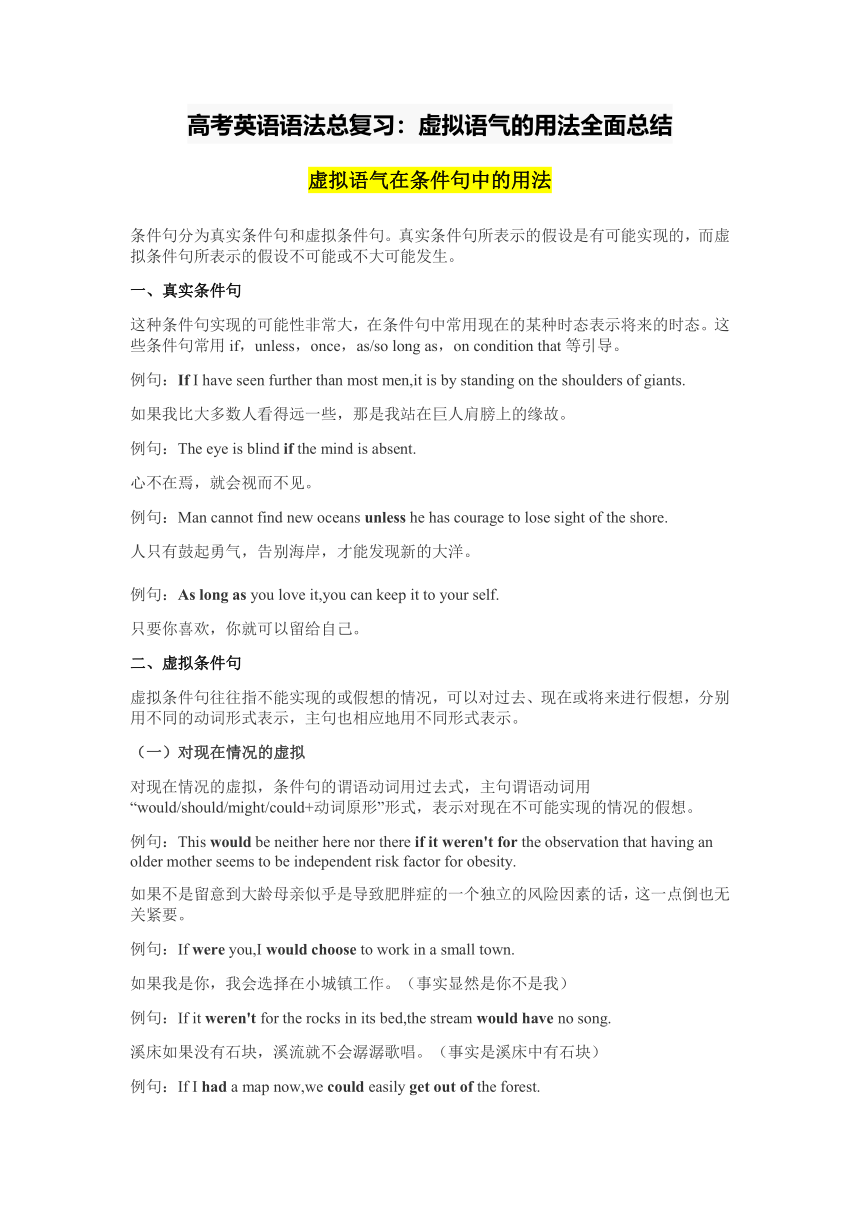 | |
| 格式 | doc | ||
| 文件大小 | 68.5KB | ||
| 资源类型 | 教案 | ||
| 版本资源 | 通用版 | ||
| 科目 | 英语 | ||
| 更新时间 | 2021-11-20 21:49:52 | ||
图片预览

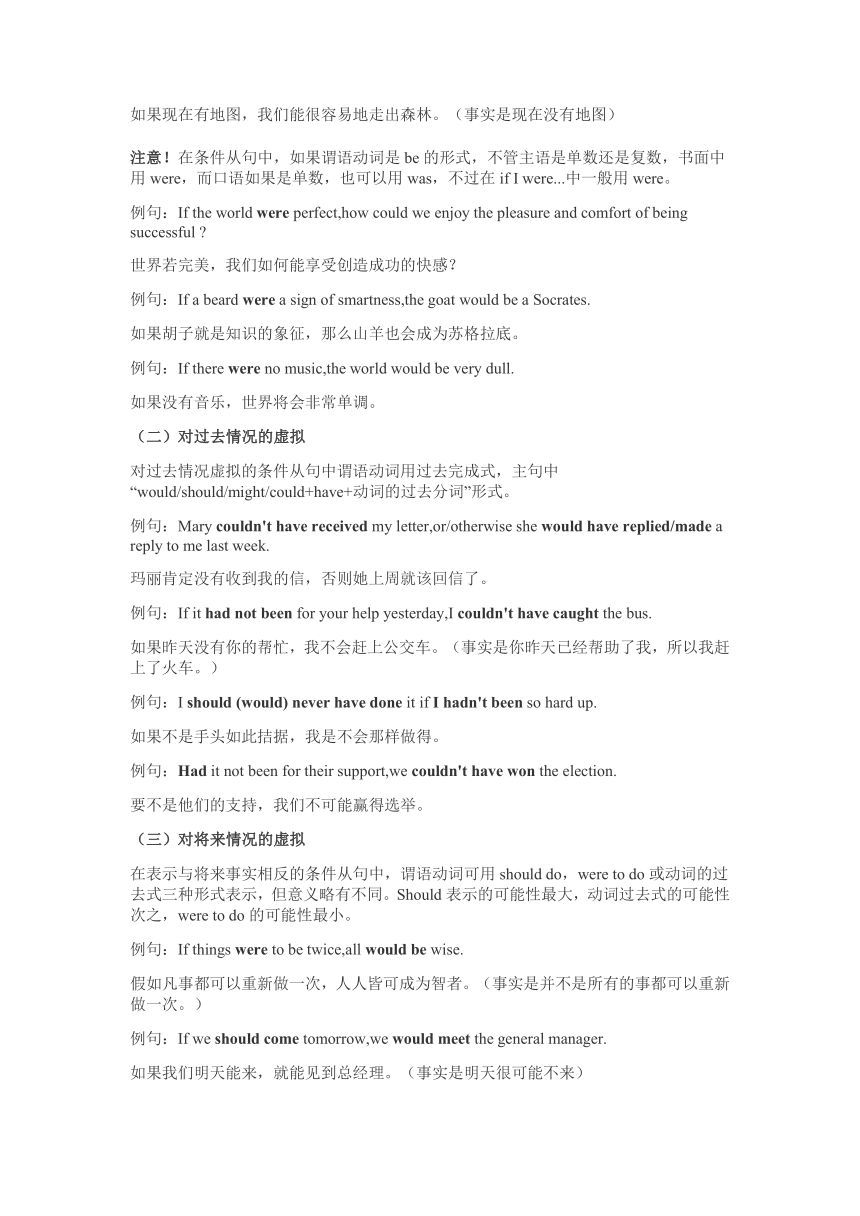
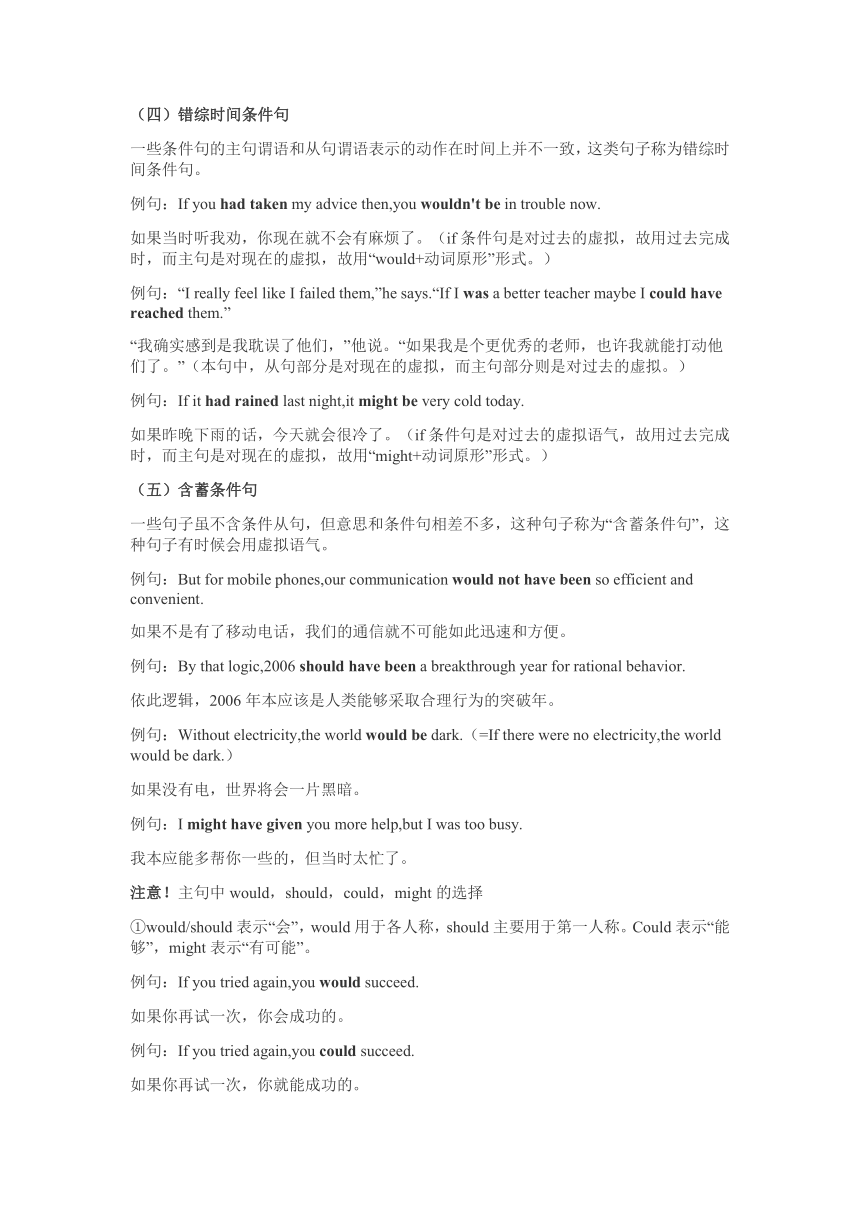
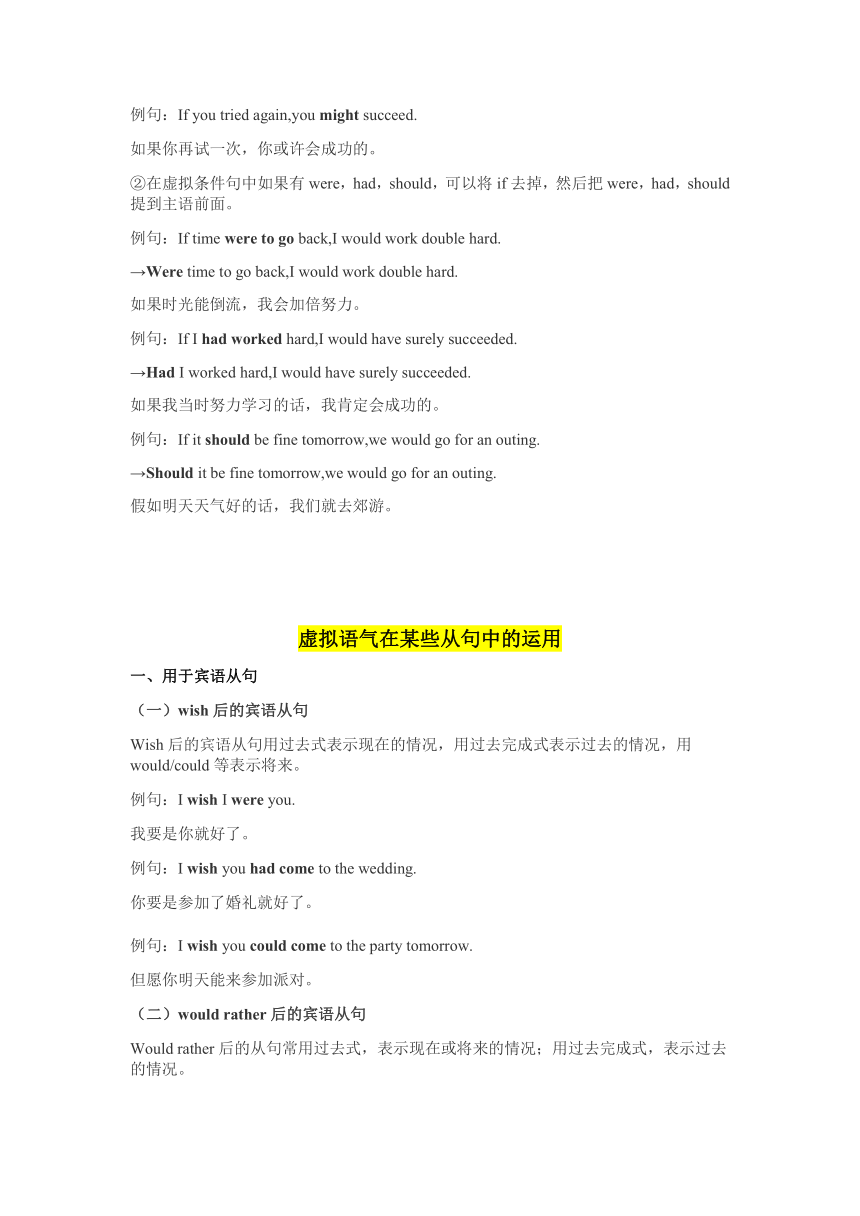
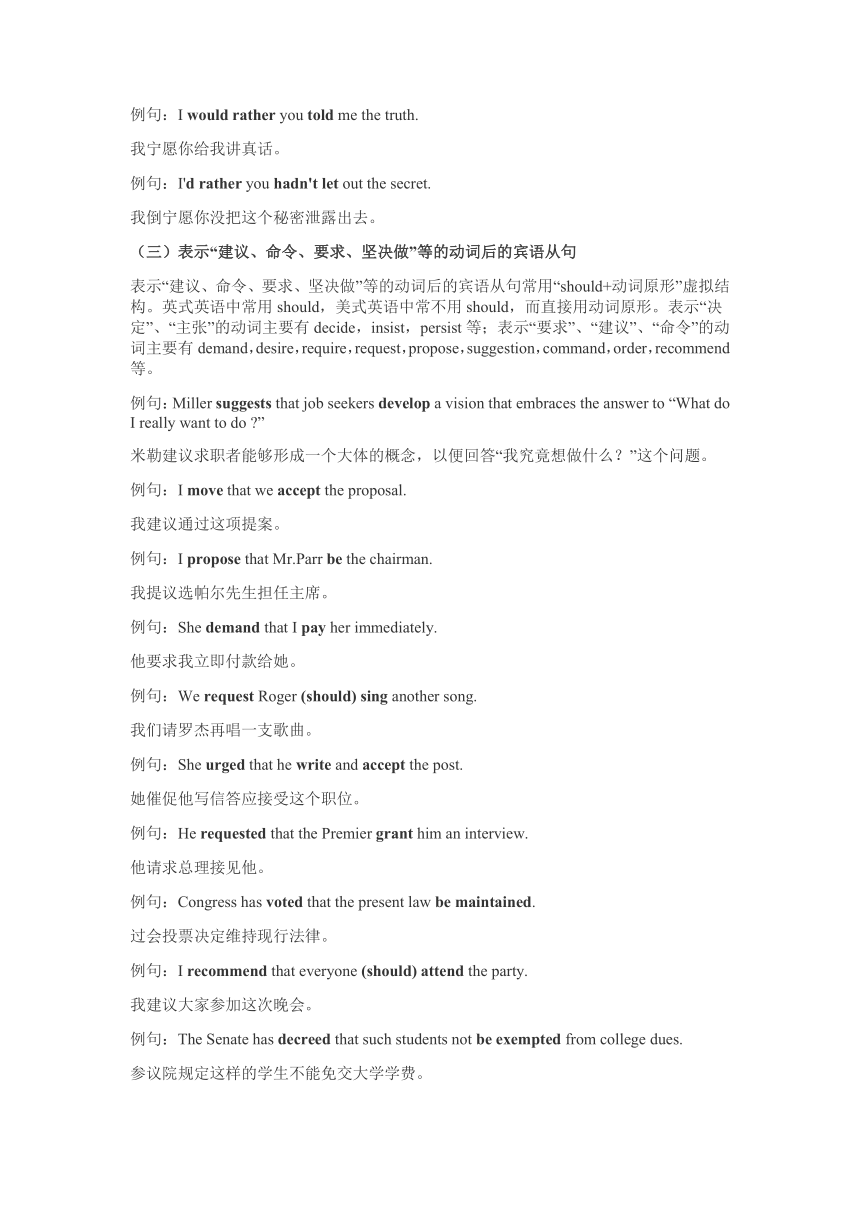
文档简介
高考英语语法总复习:虚拟语气的用法全面总结
虚拟语气在条件句中的用法
条件句分为真实条件句和虚拟条件句。真实条件句所表示的假设是有可能实现的,而虚拟条件句所表示的假设不可能或不大可能发生。
一、真实条件句
这种条件句实现的可能性非常大,在条件句中常用现在的某种时态表示将来的时态。这些条件句常用if,unless,once,as/so long as,on condition that等引导。
例句:If I have seen further than most men,it is by standing on the shoulders of giants.
如果我比大多数人看得远一些,那是我站在巨人肩膀上的缘故。
例句:The eye is blind if the mind is absent.
心不在焉,就会视而不见。
例句:Man cannot find new oceans unless he has courage to lose sight of the shore.
人只有鼓起勇气,告别海岸,才能发现新的大洋。
例句:As long as you love it,you can keep it to your self.
只要你喜欢,你就可以留给自己。
二、虚拟条件句
虚拟条件句往往指不能实现的或假想的情况,可以对过去、现在或将来进行假想,分别用不同的动词形式表示,主句也相应地用不同形式表示。
(一)对现在情况的虚拟
对现在情况的虚拟,条件句的谓语动词用过去式,主句谓语动词用“would/should/might/could+动词原形”形式,表示对现在不可能实现的情况的假想。
例句:This would be neither here nor there if it weren't for the observation that having an older mother seems to be independent risk factor for obesity.
如果不是留意到大龄母亲似乎是导致肥胖症的一个独立的风险因素的话,这一点倒也无关紧要。
例句:If were you,I would choose to work in a small town.
如果我是你,我会选择在小城镇工作。(事实显然是你不是我)
例句:If it weren't for the rocks in its bed,the stream would have no song.
溪床如果没有石块,溪流就不会潺潺歌唱。(事实是溪床中有石块)
例句:If I had a map now,we could easily get out of the forest.
如果现在有地图,我们能很容易地走出森林。(事实是现在没有地图)
注意!在条件从句中,如果谓语动词是be的形式,不管主语是单数还是复数,书面中用were,而口语如果是单数,也可以用was,不过在if I were...中一般用were。
例句:If the world were perfect,how could we enjoy the pleasure and comfort of being successful
世界若完美,我们如何能享受创造成功的快感?
例句:If a beard were a sign of smartness,the goat would be a Socrates.
如果胡子就是知识的象征,那么山羊也会成为苏格拉底。
例句:If there were no music,the world would be very dull.
如果没有音乐,世界将会非常单调。
(二)对过去情况的虚拟
对过去情况虚拟的条件从句中谓语动词用过去完成式,主句中“would/should/might/could+have+动词的过去分词”形式。
例句:Mary couldn't have received my letter,or/otherwise she would have replied/made a reply to me last week.
玛丽肯定没有收到我的信,否则她上周就该回信了。
例句:If it had not been for your help yesterday,I couldn't have caught the bus.
如果昨天没有你的帮忙,我不会赶上公交车。(事实是你昨天已经帮助了我,所以我赶上了火车。)
例句:I should (would) never have done it if I hadn't been so hard up.
如果不是手头如此拮据,我是不会那样做得。
例句:Had it not been for their support,we couldn't have won the election.
要不是他们的支持,我们不可能赢得选举。
(三)对将来情况的虚拟
在表示与将来事实相反的条件从句中,谓语动词可用should do,were to do或动词的过去式三种形式表示,但意义略有不同。Should表示的可能性最大,动词过去式的可能性次之,were to do的可能性最小。
例句:If things were to be twice,all would be wise.
假如凡事都可以重新做一次,人人皆可成为智者。(事实是并不是所有的事都可以重新做一次。)
例句:If we should come tomorrow,we would meet the general manager.
如果我们明天能来,就能见到总经理。(事实是明天很可能不来)
(四)错综时间条件句
一些条件句的主句谓语和从句谓语表示的动作在时间上并不一致,这类句子称为错综时间条件句。
例句:If you had taken my advice then,you wouldn't be in trouble now.
如果当时听我劝,你现在就不会有麻烦了。(if条件句是对过去的虚拟,故用过去完成时,而主句是对现在的虚拟,故用“would+动词原形”形式。)
例句:“I really feel like I failed them,”he says.“If I was a better teacher maybe I could have reached them.”
“我确实感到是我耽误了他们,”他说。“如果我是个更优秀的老师,也许我就能打动他们了。”(本句中,从句部分是对现在的虚拟,而主句部分则是对过去的虚拟。)
例句:If it had rained last night,it might be very cold today.
如果昨晚下雨的话,今天就会很冷了。(if条件句是对过去的虚拟语气,故用过去完成时,而主句是对现在的虚拟,故用“might+动词原形”形式。)
(五)含蓄条件句
一些句子虽不含条件从句,但意思和条件句相差不多,这种句子称为“含蓄条件句”,这种句子有时候会用虚拟语气。
例句:But for mobile phones,our communication would not have been so efficient and convenient.
如果不是有了移动电话,我们的通信就不可能如此迅速和方便。
例句:By that logic,2006 should have been a breakthrough year for rational behavior.
依此逻辑,2006年本应该是人类能够采取合理行为的突破年。
例句:Without electricity,the world would be dark.(=If there were no electricity,the world would be dark.)
如果没有电,世界将会一片黑暗。
例句:I might have given you more help,but I was too busy.
我本应能多帮你一些的,但当时太忙了。
注意!主句中would,should,could,might的选择
①would/should表示“会”,would用于各人称,should主要用于第一人称。Could表示“能够”,might表示“有可能”。
例句:If you tried again,you would succeed.
如果你再试一次,你会成功的。
例句:If you tried again,you could succeed.
如果你再试一次,你就能成功的。
例句:If you tried again,you might succeed.
如果你再试一次,你或许会成功的。
②在虚拟条件句中如果有were,had,should,可以将if去掉,然后把were,had,should提到主语前面。
例句:If time were to go back,I would work double hard.
→Were time to go back,I would work double hard.
如果时光能倒流,我会加倍努力。
例句:If I had worked hard,I would have surely succeeded.
→Had I worked hard,I would have surely succeeded.
如果我当时努力学习的话,我肯定会成功的。
例句:If it should be fine tomorrow,we would go for an outing.
→Should it be fine tomorrow,we would go for an outing.
假如明天天气好的话,我们就去郊游。
虚拟语气在某些从句中的运用
一、用于宾语从句
(一)wish后的宾语从句
Wish后的宾语从句用过去式表示现在的情况,用过去完成式表示过去的情况,用would/could等表示将来。
例句:I wish I were you.
我要是你就好了。
例句:I wish you had come to the wedding.
你要是参加了婚礼就好了。
例句:I wish you could come to the party tomorrow.
但愿你明天能来参加派对。
(二)would rather后的宾语从句
Would rather后的从句常用过去式,表示现在或将来的情况;用过去完成式,表示过去的情况。
例句:I would rather you told me the truth.
我宁愿你给我讲真话。
例句:I'd rather you hadn't let out the secret.
我倒宁愿你没把这个秘密泄露出去。
(三)表示“建议、命令、要求、坚决做”等的动词后的宾语从句
表示“建议、命令、要求、坚决做”等的动词后的宾语从句常用“should+动词原形”虚拟结构。英式英语中常用should,美式英语中常不用should,而直接用动词原形。表示“决定”、“主张”的动词主要有decide,insist,persist等;表示“要求”、“建议”、“命令”的动词主要有demand,desire,require,request,propose,suggestion,command,order,recommend等。
例句:Miller suggests that job seekers develop a vision that embraces the answer to “What do I really want to do ”
米勒建议求职者能够形成一个大体的概念,以便回答“我究竟想做什么?”这个问题。
例句:I move that we accept the proposal.
我建议通过这项提案。
例句:I propose that Mr.Parr be the chairman.
我提议选帕尔先生担任主席。
例句:She demand that I pay her immediately.
他要求我立即付款给她。
例句:We request Roger (should) sing another song.
我们请罗杰再唱一支歌曲。
例句:She urged that he write and accept the post.
她催促他写信答应接受这个职位。
例句:He requested that the Premier grant him an interview.
他请求总理接见他。
例句:Congress has voted that the present law be maintained.
过会投票决定维持现行法律。
例句:I recommend that everyone (should) attend the party.
我建议大家参加这次晚会。
例句:The Senate has decreed that such students not be exempted from college dues.
参议院规定这样的学生不能免交大学学费。
例句:They intended that the news (should) be suppressed.
他们打算封锁这天消息。
例句:She petitioned the king that her son (should) be pardoned.
她恳求国王宽恕她的儿子。
注意!Suggest意为“暗示,表明”、insist意为“坚持说,坚持认为”时,从句中应用陈述语气。
例句:The smile on his face suggested that he agreed to this plan.
他脸上微笑表明他同意这项计划。
例句:The boy insisted that he hadn't broken the window.
小男孩坚持说他没有打碎窗户。
二、用于主语从句
在主语从句中,虚拟语气用“should+动词原形”或将should省略只用动词原形。这种主语从句由连词that引导。常用在以下三种句型之中。
(一)It is/was important (necessary,appropriate,proper,right,essential,vital,etc.) that...在这种句型中,should常译为“应该”、“必须”
例句:It is appropriate that this tax be abolished.
废除这项税收是合适的。
例句:It's imperative that you (should) not be seen here.
你不要在这里露面,这很要进。
例句:It is very important that you (should) think before we decide.
三思而后行是非常重要的。
例句:It is vital to your health that you (should) take this medicine.
吃这种药对你的身体健康很重要。
(二)It is/was unnatural (unthinkable,strange,surprising,dreadful,a surprise,etc.) that...在这种句型中,should常译为“竟然”,表示一种不可思议的状况
例句:It is strange that he (should) be so rude.
真奇怪,他竟然这么粗鲁。
例句:It seems unthinkable that you (should) make such a mistake.
你竟然犯这种错误,真是不可思议。
(三)It is/was suggested (requested,required,ordered,proposed,decided,etc.)that...
例句:It is suggested that parents (should) spend more time with their children alone.
专家建议父母应该花更多的时间和孩子单独在一起。
例句:It is required that the students (should) learn a foreign language and the IT course.
学校要求学生必须学一门外语和IT课程。
例句:It is proposed that we (should) take the 9:00 train.
我们应该乘九点的火车。
三、用于表语从句
(一)as if,as though引导的表语从句中的虚拟语气
例句:It looks as if he were intoxicated.
他看上去好像喝醉了。
例句:The pencil seems as though it were broken when it is partly put in the water.
当把铅笔的一部分放入水中时,他看上去好像断了一样。
As if/as though也可引导事实或很大可能是事实的从句,常用在look,seem,taste,smell,sound等系动词后。
例句:It looks as if it is going to snow.
天仿佛要下雪。(事实上马上就要下雪)
(二)与表示“决定、主张、要求、建议、命令”等的动词相对应的名词(如suggestion,proposal,advice,demand,order,requirement等)构成的表语从句中常用“(should+)动词原形”结构
例句:Our decision is that the meeting (should) be put off.
我们的决定是把会议推迟。
例句:My suggestion is that we (should) walk home instead of taking a taxi.
我的建议是走着回去,不坐出租车。
例句:The requirement is that every student (should) donate one or two books.
要求是每位学生捐一至两本书。
四、用于同位语从句
与表示“决定、主张、要求、建议、命令”等的动词相对应的名词(如suggestion,proposal,advice,demand,order,requirement等)构成的同位语从句中常用“(should+)动词原形”结构
例句:He made a suggestion that they (should) hold an English speech contest.
他提议举行一次英语演讲比赛。
例句:Doctors give us some advice that we (should) pay more attention to our health.
医生建议我们多注意自己的身体。
五、用于状语从句
(一)用于as if/as though引导的状语从句
as if/as though引导状语从句表示与事实相反的情况。
例句:She walks as if she were drunk.
她走起路来就像喝醉了。
例句:They talked as if they had met before.
他们谈论的起劲,好像以前见过面似的。
有些让步从句中也可能用虚拟语气,特别是某些句型,其中有些用现在虚拟语气,有些用may,might,would构成谓语:
例句:Though he be the present himself,he shall hear us.
虽然他自己是总统,但是也应该倾听我们的心声。
例句:Whatever be the reason for his action,we cannot tolerate such disloyalty.
不管他这样做的原因何在,我们都不能容忍这种不忠诚的行为。
例句:Come what may,we will go ahead with our plan.
不管发生什么情况,我们也要推行这个计划。
例句:Poor though you might be,you cannot live all your life on charity.
尽管你穷,你也不能一辈子靠救济金过日子。
(二)用于目的状语从句
1)引导这类目的状语从句的短语为in order that,so that,for fear that,in case,lest等,从句中谓语动词形式为“should (may,might,can,could,would等)+动词原形”
例句:He raised his hand up so that he could be seen.
他高高地举起手以便别人能看见他。
例句:Bring some money in case you might use it later.
带一些钱,以备后用。
2)有些目的状语从句也可用虚拟语气作谓语(主要是用动词原形)
例句:They removed the prisoner in order that he not disturb the proceedings any further.
他们把犯人带走以免继续干扰诉讼进程。
例句:Lest anyone should think it strange,let me assure you that it is quite true.
我向你们保证那是真实的,以免有人觉得奇怪。
虚拟语气的一些其他用法
一、表示祝愿
在一些表示祝愿的话语中仍可找到虚拟语气(多用动词原形)。
例句:May you be happy !
祝你幸福!
例句:May you succeed !
祝你成功!
例句:Long live peace !
和平万岁!
例句:God bless you !
上帝保佑你!
二、It is (high) time (that)...句型
在It's (high) time that后的句子中要用虚拟语气,多用过去式,也可用“should+动词原形”。
例句:It's high time you got a job and set up home.
你早该找份工作,安个家了。
例句:It's high time she should go to school.
她早该去学校了。
三、if only句型
If only后跟虚拟语气表示“要是......就好了”。
例句:If only I were younger.
我要是年轻一些就好了。
例句:If only I had come to the party yesterday.
如果昨天我来参加聚会就好了。
四、在少数句型中谓语需要用虚拟语气
1)由that引导的句子(表示愿望或沮丧情绪)
例句:Oh,that I were with her now !
但愿我现在和他在一起!
例句:That I should be accused of murder !
我竟然被控谋杀!
2)由would that引导的句子(表示“但愿......”)
例句:Would that we had seen her before she died.
如果在她临终前我们去见她一面就好了。
例句:Would that he could have listened to his father.
他要是听了他父亲的话就好了。
3)由to think引导的句子(表示“没想到......”)
例句:To think that I trusted him !
没想到我竟然信任了他。
例句:To think he knew about it all the time !
没想到这事他一直都知道!
五、某些成(短)语本身就包含虚拟语气
1)as it were (were就是虚拟语气)-通常插在句子中间,表示“姑且这么说”
例句:He is,as it were,a walking dictionary.
他可以说是一部活字典。
例句:The English,the Scots and the Welsh are all,as it were,members of the same family.
英格兰人、苏格兰人和威尔士人都可以说是一家人。
2)would have thought-本身也是虚拟语气,表示“会想到”、“会以为”等
例句:Who would have thought to see you here !
谁会想到在这里见到你!
例句:You would have thought they would do more to help us.
你原本以为他们会多帮助我们一些。
3)if need be-表示“如果必要”
例句:I can earn my own living if need be.
如果有必要,我可以自己赚钱维持生活。
例句:If need be,I can do extra work at the weekend.
倘有必要,我可以在周末加班。
虚拟语气在条件句中的用法
条件句分为真实条件句和虚拟条件句。真实条件句所表示的假设是有可能实现的,而虚拟条件句所表示的假设不可能或不大可能发生。
一、真实条件句
这种条件句实现的可能性非常大,在条件句中常用现在的某种时态表示将来的时态。这些条件句常用if,unless,once,as/so long as,on condition that等引导。
例句:If I have seen further than most men,it is by standing on the shoulders of giants.
如果我比大多数人看得远一些,那是我站在巨人肩膀上的缘故。
例句:The eye is blind if the mind is absent.
心不在焉,就会视而不见。
例句:Man cannot find new oceans unless he has courage to lose sight of the shore.
人只有鼓起勇气,告别海岸,才能发现新的大洋。
例句:As long as you love it,you can keep it to your self.
只要你喜欢,你就可以留给自己。
二、虚拟条件句
虚拟条件句往往指不能实现的或假想的情况,可以对过去、现在或将来进行假想,分别用不同的动词形式表示,主句也相应地用不同形式表示。
(一)对现在情况的虚拟
对现在情况的虚拟,条件句的谓语动词用过去式,主句谓语动词用“would/should/might/could+动词原形”形式,表示对现在不可能实现的情况的假想。
例句:This would be neither here nor there if it weren't for the observation that having an older mother seems to be independent risk factor for obesity.
如果不是留意到大龄母亲似乎是导致肥胖症的一个独立的风险因素的话,这一点倒也无关紧要。
例句:If were you,I would choose to work in a small town.
如果我是你,我会选择在小城镇工作。(事实显然是你不是我)
例句:If it weren't for the rocks in its bed,the stream would have no song.
溪床如果没有石块,溪流就不会潺潺歌唱。(事实是溪床中有石块)
例句:If I had a map now,we could easily get out of the forest.
如果现在有地图,我们能很容易地走出森林。(事实是现在没有地图)
注意!在条件从句中,如果谓语动词是be的形式,不管主语是单数还是复数,书面中用were,而口语如果是单数,也可以用was,不过在if I were...中一般用were。
例句:If the world were perfect,how could we enjoy the pleasure and comfort of being successful
世界若完美,我们如何能享受创造成功的快感?
例句:If a beard were a sign of smartness,the goat would be a Socrates.
如果胡子就是知识的象征,那么山羊也会成为苏格拉底。
例句:If there were no music,the world would be very dull.
如果没有音乐,世界将会非常单调。
(二)对过去情况的虚拟
对过去情况虚拟的条件从句中谓语动词用过去完成式,主句中“would/should/might/could+have+动词的过去分词”形式。
例句:Mary couldn't have received my letter,or/otherwise she would have replied/made a reply to me last week.
玛丽肯定没有收到我的信,否则她上周就该回信了。
例句:If it had not been for your help yesterday,I couldn't have caught the bus.
如果昨天没有你的帮忙,我不会赶上公交车。(事实是你昨天已经帮助了我,所以我赶上了火车。)
例句:I should (would) never have done it if I hadn't been so hard up.
如果不是手头如此拮据,我是不会那样做得。
例句:Had it not been for their support,we couldn't have won the election.
要不是他们的支持,我们不可能赢得选举。
(三)对将来情况的虚拟
在表示与将来事实相反的条件从句中,谓语动词可用should do,were to do或动词的过去式三种形式表示,但意义略有不同。Should表示的可能性最大,动词过去式的可能性次之,were to do的可能性最小。
例句:If things were to be twice,all would be wise.
假如凡事都可以重新做一次,人人皆可成为智者。(事实是并不是所有的事都可以重新做一次。)
例句:If we should come tomorrow,we would meet the general manager.
如果我们明天能来,就能见到总经理。(事实是明天很可能不来)
(四)错综时间条件句
一些条件句的主句谓语和从句谓语表示的动作在时间上并不一致,这类句子称为错综时间条件句。
例句:If you had taken my advice then,you wouldn't be in trouble now.
如果当时听我劝,你现在就不会有麻烦了。(if条件句是对过去的虚拟,故用过去完成时,而主句是对现在的虚拟,故用“would+动词原形”形式。)
例句:“I really feel like I failed them,”he says.“If I was a better teacher maybe I could have reached them.”
“我确实感到是我耽误了他们,”他说。“如果我是个更优秀的老师,也许我就能打动他们了。”(本句中,从句部分是对现在的虚拟,而主句部分则是对过去的虚拟。)
例句:If it had rained last night,it might be very cold today.
如果昨晚下雨的话,今天就会很冷了。(if条件句是对过去的虚拟语气,故用过去完成时,而主句是对现在的虚拟,故用“might+动词原形”形式。)
(五)含蓄条件句
一些句子虽不含条件从句,但意思和条件句相差不多,这种句子称为“含蓄条件句”,这种句子有时候会用虚拟语气。
例句:But for mobile phones,our communication would not have been so efficient and convenient.
如果不是有了移动电话,我们的通信就不可能如此迅速和方便。
例句:By that logic,2006 should have been a breakthrough year for rational behavior.
依此逻辑,2006年本应该是人类能够采取合理行为的突破年。
例句:Without electricity,the world would be dark.(=If there were no electricity,the world would be dark.)
如果没有电,世界将会一片黑暗。
例句:I might have given you more help,but I was too busy.
我本应能多帮你一些的,但当时太忙了。
注意!主句中would,should,could,might的选择
①would/should表示“会”,would用于各人称,should主要用于第一人称。Could表示“能够”,might表示“有可能”。
例句:If you tried again,you would succeed.
如果你再试一次,你会成功的。
例句:If you tried again,you could succeed.
如果你再试一次,你就能成功的。
例句:If you tried again,you might succeed.
如果你再试一次,你或许会成功的。
②在虚拟条件句中如果有were,had,should,可以将if去掉,然后把were,had,should提到主语前面。
例句:If time were to go back,I would work double hard.
→Were time to go back,I would work double hard.
如果时光能倒流,我会加倍努力。
例句:If I had worked hard,I would have surely succeeded.
→Had I worked hard,I would have surely succeeded.
如果我当时努力学习的话,我肯定会成功的。
例句:If it should be fine tomorrow,we would go for an outing.
→Should it be fine tomorrow,we would go for an outing.
假如明天天气好的话,我们就去郊游。
虚拟语气在某些从句中的运用
一、用于宾语从句
(一)wish后的宾语从句
Wish后的宾语从句用过去式表示现在的情况,用过去完成式表示过去的情况,用would/could等表示将来。
例句:I wish I were you.
我要是你就好了。
例句:I wish you had come to the wedding.
你要是参加了婚礼就好了。
例句:I wish you could come to the party tomorrow.
但愿你明天能来参加派对。
(二)would rather后的宾语从句
Would rather后的从句常用过去式,表示现在或将来的情况;用过去完成式,表示过去的情况。
例句:I would rather you told me the truth.
我宁愿你给我讲真话。
例句:I'd rather you hadn't let out the secret.
我倒宁愿你没把这个秘密泄露出去。
(三)表示“建议、命令、要求、坚决做”等的动词后的宾语从句
表示“建议、命令、要求、坚决做”等的动词后的宾语从句常用“should+动词原形”虚拟结构。英式英语中常用should,美式英语中常不用should,而直接用动词原形。表示“决定”、“主张”的动词主要有decide,insist,persist等;表示“要求”、“建议”、“命令”的动词主要有demand,desire,require,request,propose,suggestion,command,order,recommend等。
例句:Miller suggests that job seekers develop a vision that embraces the answer to “What do I really want to do ”
米勒建议求职者能够形成一个大体的概念,以便回答“我究竟想做什么?”这个问题。
例句:I move that we accept the proposal.
我建议通过这项提案。
例句:I propose that Mr.Parr be the chairman.
我提议选帕尔先生担任主席。
例句:She demand that I pay her immediately.
他要求我立即付款给她。
例句:We request Roger (should) sing another song.
我们请罗杰再唱一支歌曲。
例句:She urged that he write and accept the post.
她催促他写信答应接受这个职位。
例句:He requested that the Premier grant him an interview.
他请求总理接见他。
例句:Congress has voted that the present law be maintained.
过会投票决定维持现行法律。
例句:I recommend that everyone (should) attend the party.
我建议大家参加这次晚会。
例句:The Senate has decreed that such students not be exempted from college dues.
参议院规定这样的学生不能免交大学学费。
例句:They intended that the news (should) be suppressed.
他们打算封锁这天消息。
例句:She petitioned the king that her son (should) be pardoned.
她恳求国王宽恕她的儿子。
注意!Suggest意为“暗示,表明”、insist意为“坚持说,坚持认为”时,从句中应用陈述语气。
例句:The smile on his face suggested that he agreed to this plan.
他脸上微笑表明他同意这项计划。
例句:The boy insisted that he hadn't broken the window.
小男孩坚持说他没有打碎窗户。
二、用于主语从句
在主语从句中,虚拟语气用“should+动词原形”或将should省略只用动词原形。这种主语从句由连词that引导。常用在以下三种句型之中。
(一)It is/was important (necessary,appropriate,proper,right,essential,vital,etc.) that...在这种句型中,should常译为“应该”、“必须”
例句:It is appropriate that this tax be abolished.
废除这项税收是合适的。
例句:It's imperative that you (should) not be seen here.
你不要在这里露面,这很要进。
例句:It is very important that you (should) think before we decide.
三思而后行是非常重要的。
例句:It is vital to your health that you (should) take this medicine.
吃这种药对你的身体健康很重要。
(二)It is/was unnatural (unthinkable,strange,surprising,dreadful,a surprise,etc.) that...在这种句型中,should常译为“竟然”,表示一种不可思议的状况
例句:It is strange that he (should) be so rude.
真奇怪,他竟然这么粗鲁。
例句:It seems unthinkable that you (should) make such a mistake.
你竟然犯这种错误,真是不可思议。
(三)It is/was suggested (requested,required,ordered,proposed,decided,etc.)that...
例句:It is suggested that parents (should) spend more time with their children alone.
专家建议父母应该花更多的时间和孩子单独在一起。
例句:It is required that the students (should) learn a foreign language and the IT course.
学校要求学生必须学一门外语和IT课程。
例句:It is proposed that we (should) take the 9:00 train.
我们应该乘九点的火车。
三、用于表语从句
(一)as if,as though引导的表语从句中的虚拟语气
例句:It looks as if he were intoxicated.
他看上去好像喝醉了。
例句:The pencil seems as though it were broken when it is partly put in the water.
当把铅笔的一部分放入水中时,他看上去好像断了一样。
As if/as though也可引导事实或很大可能是事实的从句,常用在look,seem,taste,smell,sound等系动词后。
例句:It looks as if it is going to snow.
天仿佛要下雪。(事实上马上就要下雪)
(二)与表示“决定、主张、要求、建议、命令”等的动词相对应的名词(如suggestion,proposal,advice,demand,order,requirement等)构成的表语从句中常用“(should+)动词原形”结构
例句:Our decision is that the meeting (should) be put off.
我们的决定是把会议推迟。
例句:My suggestion is that we (should) walk home instead of taking a taxi.
我的建议是走着回去,不坐出租车。
例句:The requirement is that every student (should) donate one or two books.
要求是每位学生捐一至两本书。
四、用于同位语从句
与表示“决定、主张、要求、建议、命令”等的动词相对应的名词(如suggestion,proposal,advice,demand,order,requirement等)构成的同位语从句中常用“(should+)动词原形”结构
例句:He made a suggestion that they (should) hold an English speech contest.
他提议举行一次英语演讲比赛。
例句:Doctors give us some advice that we (should) pay more attention to our health.
医生建议我们多注意自己的身体。
五、用于状语从句
(一)用于as if/as though引导的状语从句
as if/as though引导状语从句表示与事实相反的情况。
例句:She walks as if she were drunk.
她走起路来就像喝醉了。
例句:They talked as if they had met before.
他们谈论的起劲,好像以前见过面似的。
有些让步从句中也可能用虚拟语气,特别是某些句型,其中有些用现在虚拟语气,有些用may,might,would构成谓语:
例句:Though he be the present himself,he shall hear us.
虽然他自己是总统,但是也应该倾听我们的心声。
例句:Whatever be the reason for his action,we cannot tolerate such disloyalty.
不管他这样做的原因何在,我们都不能容忍这种不忠诚的行为。
例句:Come what may,we will go ahead with our plan.
不管发生什么情况,我们也要推行这个计划。
例句:Poor though you might be,you cannot live all your life on charity.
尽管你穷,你也不能一辈子靠救济金过日子。
(二)用于目的状语从句
1)引导这类目的状语从句的短语为in order that,so that,for fear that,in case,lest等,从句中谓语动词形式为“should (may,might,can,could,would等)+动词原形”
例句:He raised his hand up so that he could be seen.
他高高地举起手以便别人能看见他。
例句:Bring some money in case you might use it later.
带一些钱,以备后用。
2)有些目的状语从句也可用虚拟语气作谓语(主要是用动词原形)
例句:They removed the prisoner in order that he not disturb the proceedings any further.
他们把犯人带走以免继续干扰诉讼进程。
例句:Lest anyone should think it strange,let me assure you that it is quite true.
我向你们保证那是真实的,以免有人觉得奇怪。
虚拟语气的一些其他用法
一、表示祝愿
在一些表示祝愿的话语中仍可找到虚拟语气(多用动词原形)。
例句:May you be happy !
祝你幸福!
例句:May you succeed !
祝你成功!
例句:Long live peace !
和平万岁!
例句:God bless you !
上帝保佑你!
二、It is (high) time (that)...句型
在It's (high) time that后的句子中要用虚拟语气,多用过去式,也可用“should+动词原形”。
例句:It's high time you got a job and set up home.
你早该找份工作,安个家了。
例句:It's high time she should go to school.
她早该去学校了。
三、if only句型
If only后跟虚拟语气表示“要是......就好了”。
例句:If only I were younger.
我要是年轻一些就好了。
例句:If only I had come to the party yesterday.
如果昨天我来参加聚会就好了。
四、在少数句型中谓语需要用虚拟语气
1)由that引导的句子(表示愿望或沮丧情绪)
例句:Oh,that I were with her now !
但愿我现在和他在一起!
例句:That I should be accused of murder !
我竟然被控谋杀!
2)由would that引导的句子(表示“但愿......”)
例句:Would that we had seen her before she died.
如果在她临终前我们去见她一面就好了。
例句:Would that he could have listened to his father.
他要是听了他父亲的话就好了。
3)由to think引导的句子(表示“没想到......”)
例句:To think that I trusted him !
没想到我竟然信任了他。
例句:To think he knew about it all the time !
没想到这事他一直都知道!
五、某些成(短)语本身就包含虚拟语气
1)as it were (were就是虚拟语气)-通常插在句子中间,表示“姑且这么说”
例句:He is,as it were,a walking dictionary.
他可以说是一部活字典。
例句:The English,the Scots and the Welsh are all,as it were,members of the same family.
英格兰人、苏格兰人和威尔士人都可以说是一家人。
2)would have thought-本身也是虚拟语气,表示“会想到”、“会以为”等
例句:Who would have thought to see you here !
谁会想到在这里见到你!
例句:You would have thought they would do more to help us.
你原本以为他们会多帮助我们一些。
3)if need be-表示“如果必要”
例句:I can earn my own living if need be.
如果有必要,我可以自己赚钱维持生活。
例句:If need be,I can do extra work at the weekend.
倘有必要,我可以在周末加班。
